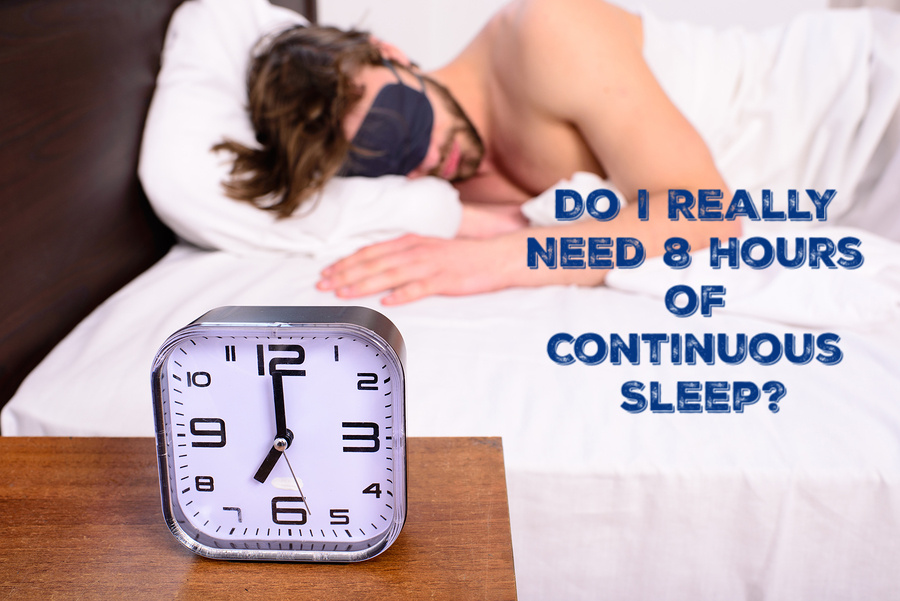By: Lauri Leadley, CCSH, RPSGT – Clinical Sleep Educator|Sleep Coach

Lauri Leadley, Clinical Sleep Educator, President of Valley Sleep Center
Sleep is fundamental to good physical and mental health. When you are rested sufficiently, the body and brain are energized and you tend to be sharp, focused, and more productive.
However, a common question people have regarding sleep is this – how many hours should I sleep to feel rested and invigorated?
An off-shoot of this question, and probably something most people are curious about, is – do I really need eight hours of continuous sleep?
There is a greater context to both these questions which extends beyond just the number of hours a person sleeps to include the quality of sleep and its impact on physical and mental health.
What is the Definition of “A Good Night’s Sleep?”
The short and simple response to these questions – how fresh and rested do you feel when you wake up?
If you were to do a flash survey and asked a group of people how many hours of sleep they clock, you’d probably get answers ranging from 4 – 9 hours. Work pressure, shift work, the condition of their health, as well as sleep disorders, genetics, age, health, and physiological explain the variations.
For this reason, some people average 6 – 7 hours and wake up feeling fresh and energized while others need eight or more hours of sleep to feel sufficiently rested.
So, if you wake up feeling refreshed and energized after 6 hours of sleep, then your body probably needs 6 full hours of sleep as opposed to 8 continuous hours. However, when we look at averages, adults need between 7-9 hours of continuous sleep each night.
Related Article – White Paper: How Much Sleep Do Adults Need?
Do You Suffer from Poor Sleep Quality?
In all the chatter about how many hours of sleep an individual needs every night, quality is often overlooked. Poor quality sleep impacts you on different levels.
It affects your mood, your energy levels, and your productivity. If you suffer from poor quality sleep for extended periods of time, it can lead to health risks like obesity, cardiovascular diseases, diabetes, and sleep disorders such as insomnia and obstructive sleep apnea (OSA).
Related Article – Are You At High Risk For Getting Sleep Apnea
Here are five signs your sleep quality is not good:
- You need more than 30 minutes to fall asleep after getting into bed.
- You suffer from insomnia.
- You have disrupted sleep – you tend to wake up more than once every night.
- You continue to stay awake for more than 20 minutes anytime you wake up at night instead of easily falling back into sleep.
- You spend less than 85 percent of the entire time you spend in bed sleeping.
If you answered with a yes to the above-mentioned points, then you need to seriously assess your sleep quality. If your problem persists and you continue to suffer from poor quality sleep, it is best to consult with a professional sleep coach ASAP. There is simply no reason to wait.
To be productive in life, you must sleep properly and sleep enough.

5 Tips for Sleeping Better
If you have been diagnosed with a health issue which is impacting your sleep quality or you suffer from a sleeping disorder, seeking medical help and consulting with a professional sleep coach is a necessary step for improving your quality of sleep.
If you enjoy decent health yet suffer from poor quality sleep, consider the following:
- Schedule your sleep – establish and stick to a set bedtime.
- Improve your sleeping space by removing all distractions, using comfortable sleep accessories (mattress, pillow, etc.), and ensuring optimal room temperature. In short, making your sleep space conducive for just that–sleep.
- Avoid consuming stimulants before bedtime. If medications are keeping you up, speak with your doctor about it.
- Exercise on a regular basis – physical activity during the day helps your body by promoting more restful and deep sleep.
- Relieve stress either through yoga, meditation, stretches, massages or any other activity which helps you to de-stress.
Valley Sleep Therapy – We Believe in Good Quality Sleep for All!
If you are looking for information about sleep devices and products or services for treating different sleep disorders, we would be more than happy to help.
You can also visit us at Valley Sleep Therapy if you are shopping for CPAP, AutoPAP, and BiLevel CPAP machines. Browse our online CPAP supplies store or visit us in Mesa, AZ today!

